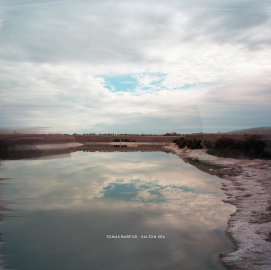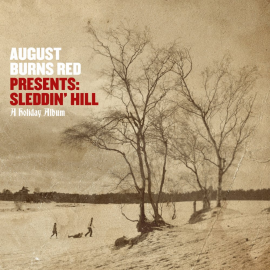Print Edition: November 21, 2012
Nick Ferrio & His Feelings
Nick Ferrio & His Feelings
Pensive, charming, and sometimes vulgar, Nick Ferrio & His Feelings’ self-titled debut sounds like the country music your grandfather used to listen to. His voice is raw and sincere, even when he’s weaving lyrical fabrications, and the music is deceptively upbeat, played with spirit and gusto, reminiscent of Cash, Nelson, Guthrie, and more recently the Traveling Wilburys. The songs he writes are poignant, witty, and heartfelt, which is what elevates the album beyond a mere homage to the previously mentioned artists. The album’s first two tracks – the slide guitar heavy “Night Garden” and “Popular Flower” are among the most appealing of the album, but it’s around the end of the bluesy third track, “Always Searching,” that the Ferrio really begins to open up emotionally. In the final moments of the song he digs into the heart of miscommunication between lovers in the pursuit of romance: “I want to fuck you! Fuck you! Fuck you! Fuck you!” and so on while his backing band chime in with do-wop style vocals. It’s a jarring, divisive and truly amusing moment that captures how Ferrio’s debut somehow never surrenders its underlying charm.
Never Shout Never
Indigo
On their fourth record since their 2007 debut, Myspace generation trio Never Shout Never have crafted an album full of contradictions. There are small moments of surprising beauty as Christopher Ingle launches into unexpected song writing turns, but the overall experience of the record is bogged down by a mismatched emo generic disposition. Indigo is fairly pop literate and soft-spoken throughout, but there are far too many unnecessary, downright boring tracks (see the flat aimlessness of “Life Goes On”) shoehorned in between the album’s better ones that prevent it from being truly memorable. “Between Two Worlds” best captures the dual creative impulses at the heart of Ingle’s project, both lyrically and musically. A doubled up snare-kick beat and staccato bridge power chords contradict the smooth, slowly moving vocals and orchestral backdrop. “Lust” once again demonstrates these competing inclinations, but to far less success. Its unfortunately fake horn intro is cut off by a dramatic piano line and soaring musical score. Herein lays the major problem with Never Shout Never: great and almost unlistenable moments invade nearly every non-boring track. “Lust” has an impressive and moving verse and an absolutely terrible intro/chorus that falls apart when Ingle half-sings “Figure it ooouuut.” Overwrought, overproduced and in serious need of a critical collaborator or producer, Never Shout Never prove to be mostly exasperating because of their evident, unrealized potential.
Tomas Barfod
Salton Sea
Tomas Barfod’s Salton Sea is composed of halves – trance and chiptune sequences alternating with guest lyric repetition over twisting, unpredictable synths. The instrumental-only material, even when building as in “Python,” exists more as a break from the best of the album, working only, as in the wind and debris pelleted “Baxter St,” as a transition into the tracks that follow, the one in this case being “November Skies,” the album’s now seasonally appropriate single—one that hopes for vision beyond the visible. Aside from the empty marimba, single drum “Till We Die,” improved upon by Blondish’s recent remix, Barfod’s arrangements work as if breathing needs digital representation, and individual sentences or couplets their own song, to wrap and record and replay. On “Broken Glass,” Jeppe Kjellberg’s voice is filtered and tuned into an unrealistic register, where love is met as “I tiptoe into broken glass/it hurts like hell, I torture the past,” and consonants tingle. Similar strains of leaden love philosophy/electronic lift echo throughout, culminating in album closer “Only Human,” where “We all make mistakes and be who we don’t want to be” is repeated as implicit act against judgment, mantra to ward off the chase of regret.
August Burns Red
Sleddin’ Hill
Behold Sleddin’ Hill, the first full-length instrumental Christmas album from the Pennsylvanian Metal band, August Burns Red. I know you’re wondering, how do blast beats, guitar solos and double bass drum pedals have a place in Christmas songs? But believe me, they do! Overall, the balance of musical genres is the success of this 13-track album. Songs like “Sleigh Ride,” and “We Wish You a Merry Christmas,” include beautiful jazz and classical portions that maintain a traditional merry tone, while the huge metal breakdown in “Frosty the Snowman” turns Frosty into a total bad ass who would destroy Professor Hinkle. The two original songs of the album, “Flurries,” and “Sleddin’ Hill,” wisely aim to recapture timeless winter occurrences instead of being futile attempts to create instant classic carols. The slow instrumental build in “Flurries” transports you to an enchanting wintery snow scene, where you inevitably engage in a momentous snowball fight. The banjo and acoustic guitar in the track “Sleddin’ Hill” brings you back to your childhood, when you were having a humdinger of a time on the hill tobogganing with your chums. The whole album is expertly thought out and is laden with fun, so give it a listen for a new sound this Christmas.





